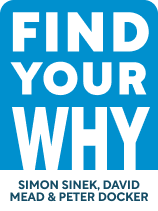

This article is an excerpt from the Shortform book guide to "Find Your Why" by Simon Sinek, David Mead, Peter Docker. Shortform has the world's best summaries and analyses of books you should be reading.
Like this article? Sign up for a free trial here .
What are the most important benefits of finding a sense of purpose? How will life improve once you find your unique purpose?
In Find Your Why, Simon Sinek, David Mead, and Peter Docker lay out the steps individuals and organizations can take to discover their purpose and strengths and share them with the world. Discovering your unique purpose—your Why—and strengths helps you find fulfillment at work and in life.
Keep reading to discover the three benefits you will enjoy by finding a sense of purpose, according to Simon Sinek.
Why Having a Sense of Purpose Matters
Sinek argues that finding your Why or purpose can help you make better choices in your work and your life that lead to greater fulfillment. That’s what he found in his own life after struggling with depression until he identified his purpose: “To inspire people to do what inspires them so that, together, we can change our world for the better.” He then began to help others find their purpose, most famously through his popular 2009 TED Talk and by working directly with individuals and organizations.
Besides coaching and giving talks, Sinek shared his ideas about the centrality of purpose through his bestselling book, Start With Why, also published in 2009. In that book, he outlined his theory that the most successful organizations are the ones that have a clear purpose and stick to it as they grow.
At the center of Sinek’s theory is a model he uses to illustrate the connection between your Why (purpose), your How (methods and practices), and your What (actions and outcomes). We will explore his model in more detail in Chapter 2 of this guide.
After several years of working directly with some organizations, Sinek realized that to achieve his purpose, he needed to broaden his impact. To provide practical help to more people, he co-wrote Find Your Why with David Mead and Peter Docker: a follow-up book that lays out a step-by-step process for finding a sense of purpose that individuals and organizations can follow.
| Is the Search for Purpose Inherent? Sinek’s concept of a Why or purpose isn’t new. In 1946, psychologist Viktor Frankl argued that the driving force in our lives is meaning, not pleasure or power, as other schools of thought at the time suggested. In Man’s Search for Meaning, he outlines three paths to finding meaning that fall under Sinek’s umbrella of “life-changing events”: action and achievement, love and connection, and suffering. Frankl also argued that the meaning of life isn’t universal, but rather something each person must find for themselves, just as Sinek believes everyone has a unique purpose they must discover. Their definitions of purpose and meaning are similar, despite originating in widely different contexts—this suggests that humans have an inherent desire to find a sense of purpose. |
We’ll explain Sinek’s theory of purpose in the first three chapters of this guide. The following three chapters cover how to prepare for the purpose-discovery process, how to follow the process, and what steps to take afterward. These chapters bring together the steps for individuals and teams, highlighting where the steps differ depending on the audience.
What Is Your Purpose?
According to Sinek, “finding your Why” means finding a sense of purpose: the single core belief that inspires you to do the work you choose to do and be the kind of person you want to be in your work, home, and family life. Sinek believes every individual and organization has a purpose, though not everyone has discovered theirs yet, or put it into words. He argues that your purpose solidifies in your twenties and stays constant. (Shortform note: Sinek’s argument that your Why is fixed by your twenties adds weight to Meg Jay’s assertion in The Defining Decade that your twenties are the time to lay down a strong foundation for a successful life. You’re better equipped to do so if you have a purpose, and you know what it is.)
Sinek acknowledges the counterargument that you’re not the same person in your forties, for example, as you were in your twenties, so your purpose will probably change throughout your lifetime. But while he concedes that life events can temporarily throw you off course from your purpose or make you reassess your priorities, he says events can’t change your core purpose.
(Shortform note: Sinek’s belief that everyone has a single purpose that remains true throughout their lifetime doesn’t match findings from research on purpose. According to studies, people’s search for and engagement with their purpose evolves through different stages of life. During our teenage years, we take an exploratory approach to purpose that becomes more urgent as we become adults and feel the pressure to have certainty on what our purpose is. Finally, during our senior years, we again take an exploratory approach after the things that gave us purpose during adulthood, including raising a family and having a career, become past accomplishments, and we look for new applications of our skills.)
Benefits of Finding a Sense of Purpose
Sinek discusses three benefits of finding a sense of purpose:
1. When you know your purpose, you can identify work that fulfills you—that is, it makes you feel you’re part of something bigger and that your work matters. Sinek believes that everyone, no matter their role or status, deserves to find fulfillment at work.
People often mistake happiness for fulfillment, but Sinek argues they aren’t the same. Happiness is temporary, but fulfillment stays with you. For example, happiness might look like getting a raise, successfully navigating a challenge, or receiving recognition for a job well done. It only lasts a short time. On the other hand, fulfillment looks like being motivated to do your work because the work itself is rewarding to you, not because of the pay or the recognition. Sinek says it’s a grounding feeling that stays with you even if you don’t get that raise, if you make a mistake, or if there’s no one around to see you do great work.
| Hits and Misses of Sinek’s Approach to Fulfillment Sinek’s approach to fulfillment differs from traditional career advice in distinguishing between fulfillment and happiness. Typical advice often conflates the two or sees them as operating in tandem. Additionally, his understanding of fulfillment as a human need is in line with long-standing theories from psychology. Psychologist Abraham Maslow theorized that we have five needs: physiological needs, and needs for safety, love and belonging, esteem, and self-actualization, or fulfillment of our potential. However, Maslow’s theory organizes human needs from most to least important, putting self-actualization last. We must meet physiological needs, like food, water, and shelter, then address safety needs, and so on. Sinek’s view that everyone should have fulfillment at work glosses over the fact that many people work to meet more basic needs. Additionally, Sinek may be giving fulfillment more weight than it warrants. In his hierarchy of needs, Maslow placed “self-actualization” at the level of least priority because self-actualization is the only level of need that doesn’t cause a person harm if they don’t achieve it. |
2. Knowing your purpose makes you more persuasive. Your energy and commitment to your purpose are contagious, so whether you want people to hire you, buy from you, or work with you, having a clear purpose helps you pitch your ideas in ways that sound more meaningful and attractive to others. For example, nonprofits that effectively communicate their purpose inspire people who believe in it to volunteer their time and skills.
(Shortform note: Jack Canfield, author of The Success Principles, agrees with Sinek that finding a sense of purpose will help others connect with you and inspire them to join you. Further, he contends that communicating your purpose in a compelling way is one of the main skills you need to become a great leader.)
3. Knowing your purpose helps you make better decisions. Your Why works as a compass directing you to the right opportunities—those that further your purpose—and keeping you from time and resource drains.
For instance, instead of taking on a client who’s difficult to work with and tarnishes your reputation, you’ll realize ahead of time that their values don’t align with yours, and you’ll therefore avoid them.(Shortform note: In Essentialism, Greg McKeown suggests practical ways to filter out nonessential pursuits using your purpose: Learn to set boundaries and say “no” gracefully, learn to say “no more” to time or money investments that no longer serve you, and have an editor’s mindset—eliminate everything except what’s essential.)

———End of Preview———
Like what you just read? Read the rest of the world's best book summary and analysis of Simon Sinek, David Mead, Peter Docker's "Find Your Why" at Shortform .
Here's what you'll find in our full Find Your Why summary :
- Simon Sinek’s steps to understanding and living your purpose and your organization’s
- How to create and write your purpose statement
- What to do after you find your Why: Determine your How






